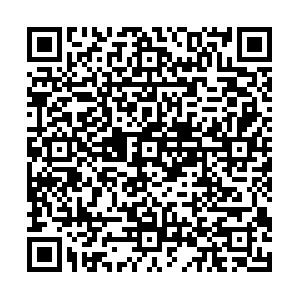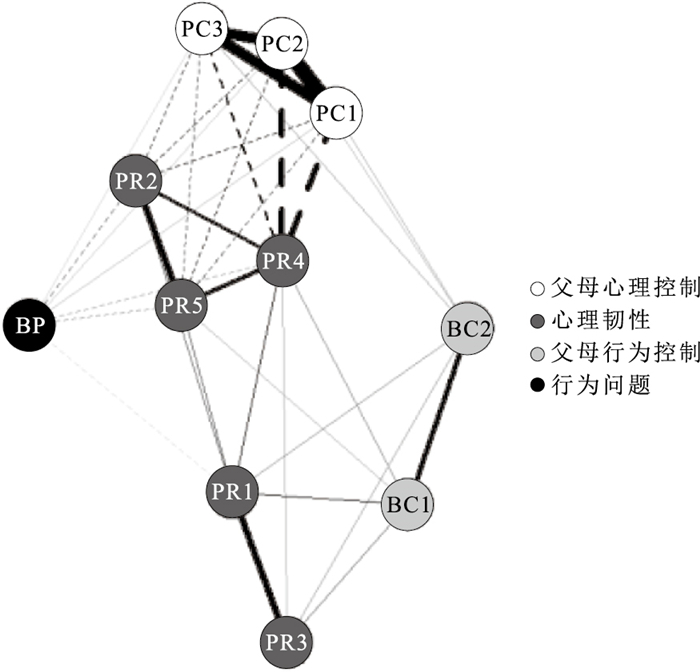Relationship among psychological resilience, parental control, and behavioral problems in junior high school students in Guizhou Province
-
摘要:
目的 探讨初中生心理韧性、父母控制与行为问题之间的关系,为初中生行为问题的预防、干预及相关政策的制定提供参考依据。 方法 于2021年8—12月,采用分层整群抽样方法抽取贵州省3个不同经济发展水平市区(贵阳市、都匀市和凯里市)共2 745名七至九年级初中学生为调查对象。采用Achenbach儿童行为量表(CBCL)、父母控制问卷、心理韧性问卷对学生及其家长进行调查,使用网络分析法构建行为问题影响因素网络分析模型。 结果 贵州省初中学生行为问题检出率为22.62%,中学生心理韧性因子(目标专注、情绪控制、积极认知、家庭支持、人际协助)以及行为控制中主动询问的得分无行为问题组均高于有行为问题组,心理控制因子得分(引发内疚、收回关爱和坚持权威)有行为问题组均高于无行为问题组,差异均有统计学意义(t值分别为9.80,17.76,6.21,12.20,13.18,6.28,11.58,11.10,10.74,P值均 < 0.05)。网络模型显示,相同变量因子间,连线权重最强的为引发内疚和收回关爱,连线权重为0.79;不同变量间,行为问题与心理韧性(目标专注、情绪控制、积极认知、家庭支持、人际协助)、行为控制(主动询问、行为约束)间均呈负相关(r值分别为-0.25,-0.42,-0.16,-0.31,-0.33,-0.17,-0.03),心理控制(引发内疚、收回关爱和坚持权威)与行为问题间呈正相关(r值分别为0.29,0.27,0.27)、与心理韧性(目标专注、情绪控制、积极认知、家庭支持、人际协助)间呈负相关(r=-0.53~-0.13)(P值均 < 0.05)。连线权重最强的是收回关爱与家庭支持为-0.53。家庭支持是联系整个行为问题网络模型的重要桥梁症状,具有较高强度的中心性。 结论 贵州省中学生行为问题检出率较高。可通过提供良好的家庭环境去培养中学生的耐挫能力,提高心理韧性,减少行为问题的发生。 Abstract:Objective To investigate the relationships among psychological resilience, parental control, and behavioral problems in middle school students, aiming to provide evidence-based recommendations for the prevention and intervention of behavioral issues in middle school students, as well as for the development of related policies. Methods A stratified cluster sampling method was used to select 2 745 participants from three cities in Guizhou Province with different levels of economic development from August to December 2021. The Child Behavior Checklist (CBCL), Parental Control Questionnaire, and Psychological Resilience Questionnaire were administered to junior high school students and their parents. A network analysis method was employed to construct a network analysis model of factors influencing behavioral problems. Results The detection rate of behavioral problems among junior high school students in Guizhou Province was 22.62%. The scores for psychological resilience (goal focus, emotional control, positive cognition, family support, and interpersonal assistance) and proactive inquiry in behavior control were higher in the group without behavioral problems than in the group with behavioral problems. Scores for psychological control (inducing guilt, with drawing affection, and asserting authority) were higher in the group with behavioral problems than in the group without behavioral problems, with statistically significant differences (t=9.80, 17.76, 6.21, 12.20, 13.18, 6.28, 11.58, 11.10, 10.74, P < 0.05). The network model showed that among the same variable factors, the strongest connection weight was between inducing guilt and withdrawing affection, with a weight of 0.79. Between different variables, there were negative correlation between behavioral problems and psychological resilience (goal focus, emotional control, positive cognition, family support, interpersonal assistance) and behavior control (proactive inquiry, behavioral restraint) with correlation coefficients (r=-0.25, -0.42, -0.16, -0.31, -0.33, -0.17, -0.03, P < 0.05), respectively. There were positive correlation between psychological control factors (inducing guilt, withdrawing affection, and asserting authority) and behavioral problems (r=0.29, 0.27, 0.27), and a negative correlation between these psychological control factors and psychological resilience factors (goal focus, emotional control, positive cognition, family support, interpersonal assistance)(r=-0.53--0.13)(P < 0.05). The strongest connection weight was between withdrawing affection and family support, with a connection weight of -0.53. Family support was an important bridge symptom connecting the entire behavioral problem network model, with a high centrality. Conclusions The detection rate of behavioral problems among junior high school students in Guizhou Province is relatively high. Assisting adolescents in establishing a supportive family environment facilitates the cultivation of their psychological resilience, thereby mitigating the occurrence of behavioral problems. -
Key words:
- Mental health /
- Behavior /
- Parental control /
- Students
1) 利益冲突声明 所有作者声明无利益冲突。 -
表 1 有无行为问题初中生心理韧性父母控制得分比较(x±s)
Table 1. Comparison of psychological resilience and parental control scores of junior high school students with and without behavioral problems(x±s)
有无行为问题 人数 心理韧性 父母心理控制 父母行为控制 目标专注 情绪控制 积极认知 家庭支持 人际协助 引发内疚 收回关爱 坚持权威 主动询问 行为约束 无 2 124 18.42±4.19 19.79±4.20 14.65±3.48 21.99±4.77 20.87±5.63 24.63±8.52 10.78±5.02 8.59±3.62 24.48±6.45 26.56±7.56 有 621 16.54±4.20 16.55±3.94 13.68±3.31 19.14±5.23 17.49±5.60 29.15±8.70 13.36±5.33 10.25±3.31 22.65±6.18 26.23±7.52 t值 9.80 17.76 6.21 12.20 13.18 -11.58 -11.10 -10.74 6.28 0.94 P值 <0.01 <0.01 <0.01 <0.01 <0.01 <0.01 <0.01 <0.01 <0.01 0.35 表 2 初中生行为问题网络分析节点连线权重(n=2 745)
Table 2. Node connection weights of network analysis of junior high school students' behavior problems(n=2 745)
变量 目标专注 情绪控制 积极认知 家庭支持 人际协助 引发内疚 收回关爱 坚持权威 主动询问 行为约束 情绪控制 0.32 积极认知 0.55 0.13 家庭支持 0.40 0.46 0.22 人际协助 0.33 0.55 0.11 0.49 引发内疚 -0.09 -0.39 0.00 -0.52 -0.36 收回关爱 -0.13 -0.41 -0.02 -0.53 -0.39 0.79 坚持权威 -0.08 -0.36 0.01 -0.43 -0.32 0.66 0.65 主动询问 0.38 0.14 0.32 0.28 0.23 -0.01 -0.02 0.00 行为约束 0.27 -0.06 0.25 -0.03 0.01 0.23 0.22 0.25 0.51 行为问题 -0.25 -0.42 -0.16 -0.31 -0.33 0.29 0.27 0.27 -0.17 -0.03 -
[1] GOODMAN R, NEVES DOS S D, ROBATTO N A P, et al. The Ilha De Maré study: a survey of child mental health problems in a predominantly African-Brazilian rural community[J]. Soc Psychiatry Psychiatr Epidemiol, 2005, 40(1): 11-17. doi: 10.1007/s00127-005-0851-z [2] FARMER E M, COMPTON S N, BUMS B J, et al. Review of the evidence base for treatment of childhood psychopathology: externalizing disorders[J]. J Consult Clin Psychol, 2002, 70(6): 1267-1302. doi: 10.1037/0022-006X.70.6.1267 [3] FOGLEMAN N D, LEABERRY K D, ROSEN P J, et al. Relation between internalizing behaviors, externalizing behaviors, and peer victimization among children with and without ADHD[J]. Atten Defic Hyperact Disord, 2018, 10(3): 209-222. doi: 10.1007/s12402-018-0248-y [4] 郑果, 张天成. 长沙市农村12~16岁儿童健康相关行为分析[J]. 科技视界, 2014(20): 145-146. https://www.cnki.com.cn/Article/CJFDTOTAL-KJSJ201420109.htmZHENG G, ZHANG T C. Analysis on the rural children aged 12 to 16 health-related behavior in Changsha[J]. Sci Technol Vis, 2014(20): 145-146. (in Chinese) https://www.cnki.com.cn/Article/CJFDTOTAL-KJSJ201420109.htm [5] EPSKAMP S, WALDORP L J, MÕTTUS R, et al. Discovering psychological dynamics in time-series data[J]. Multiv Behav Res, 2018, 53(4): 453-480. doi: 10.1080/00273171.2018.1454823 [6] BORSBOOM D, CRAMER A O J. Network analysis: an integrative approach to the structure of psychopathology[J]. Annu Rev Clin Psychol, 2013, 9(1): 91-121. doi: 10.1146/annurev-clinpsy-050212-185608 [7] GARABILES M R, LAO C K, XIONG Y, et al. Exploring comorbidity between anxiety and depression among migrant filipinodomestic workers: a network approach[J]. J Affect Disord, 2019, 250: 85-93. doi: 10.1016/j.jad.2019.02.062 [8] 忻仁娥. 儿童心理与行为的评估工具: Achenbach's儿童行为量表[J]. 心理发展与教育, 1994(1): 26, 43.XIN R E. The assessment tool for children's psychology and behavior: Achenbach's Children's Behavior Scale[J]. Psychol Dev Educ, 1994(1): 26, 43. (in Chinese) [9] WANG Q, POMERANTZ E M, CHEN H C. The role of parents' control in early adolescents' psychological functioning: a longitudinal investigation in the United States and China[J]. Child Dev, 2007, 78(5): 1592-1610. doi: 10.1111/j.1467-8624.2007.01085.x [10] 胡月琴, 甘怡群. 青少年心理韧性量表的编制和效度验证[J]. 心理学报, 2008, 40(8): 902-912. https://www.cnki.com.cn/Article/CJFDTOTAL-XLXB200808005.htmHU Y Q, GAN Y Q. Development and psychometric validity of the Resilience Scale for Chinese adolescents[J]. Acta Psychol Sinica, 2008, 40(8): 902-912. (in Chinese) https://www.cnki.com.cn/Article/CJFDTOTAL-XLXB200808005.htm [11] 生笑笑, 李静雅, 牛骅, 等. 父母严厉管教与青少年外化问题行为的关系: 青春发育时相与性别的调节作用[J]. 中国临床心理学杂志, 2019, 27(6): 1199-1204, 1209. https://www.cnki.com.cn/Article/CJFDTOTAL-ZLCY201906026.htmSHENG X X, LI J Y, NIU H, et al. Parental harsh discipline and adolescents' externalizing problem behaviors: the moderating role of puberty timinc[J]. Chin J Clin Psychol, 2019, 27(6): 1199-1204, 1209. (in Chinese) https://www.cnki.com.cn/Article/CJFDTOTAL-ZLCY201906026.htm [12] 王秋英, 黄巧敏, 刘晓凤, 等. 家庭功能对青少年早期外化问题行为的影响: 心理韧性的中介作用和性别的调节作用[J]. 心理与行为研究, 2020, 18(5): 659-665. https://www.cnki.com.cn/Article/CJFDTOTAL-CLXW202005013.htmWANG Q Y, HUANG Q M, LIU X F, et al. The association between family functioning and externalizing behaviors in eary adolescents: the mediating efect of resilience and moderatino effect of gender[J]. Stud Psychol Behav, 2020, 18(5): 659-665. (in Chinese) https://www.cnki.com.cn/Article/CJFDTOTAL-CLXW202005013.htm [13] 张芳华, 崔艳芳, 李付伟, 等. 压力与青少年外化问题行为: 社会支持的中介作用[J]. 中国健康心理学杂志, 2021, 29(12): 1883-1887. https://www.cnki.com.cn/Article/CJFDTOTAL-JKXL202112027.htmZHANG F H, CUI Y F, LI F W, et al. Stress and externalized problem behaviors among adolescents: exploring the mediation effects of social support[J]. Chin J Health Psychol, 2021, 29(12): 1883-1887. (in Chinese) https://www.cnki.com.cn/Article/CJFDTOTAL-JKXL202112027.htm [14] 刘晓洁, 李燕. 母亲感知的共同教养对幼儿行为问题的影响: 一个有调节的中介模型[J]. 心理发展与教育, 2022, 38(5): 626-634. https://www.cnki.com.cn/Article/CJFDTOTAL-XLFZ202205003.htmLIU X J, LI Y. The influence of mother's perception of coparenting on behavior problems among children: a moderated mediation mode[J]. Psychol Dev Educ, 2022, 38(5): 626-634. (in Chinese) https://www.cnki.com.cn/Article/CJFDTOTAL-XLFZ202205003.htm [15] 韩琼, 赵银. 青少年父母心理控制、心理韧性与自我效能感的关系[J]. 中国成人教育, 2023(3): 32-36. https://www.cnki.com.cn/Article/CJFDTOTAL-ZCRY202303006.htmHAN Q, ZHAO Y. The relationship between psychological control, resilience, and self-efficacy of adolescent parents[J]. Chin Adult Educ, 2023(3): 32-36. (in Chinese) https://www.cnki.com.cn/Article/CJFDTOTAL-ZCRY202303006.htm [16] 段维鑫. 青少年情绪智力与焦虑、抑郁关系: 元分析与网络分析法的研究[D]. 天津: 天津师范大学, 2023.DUAN W X. The relationship between adolescent emotional intelligence and anxiety and depression: a study of Meta-analysis and network analysis methods[D]. Tianjin: Tianjin Normal University, 2023. (in Chinese) [17] 陈琛, 王力, 曹成琦, 等. 心理病理学网络理论、方法与挑战[J]. 心理科学进展, 2021, 29(10): 1724-1739. https://www.cnki.com.cn/Article/CJFDTOTAL-XLXD202110002.htmCHEN C, WANG L, CAO C Q, et al. Psychopathological network theory, methods and challenges[J]. Adv Psychol Sci, 2021, 29(10): 1724-1739. (in Chinese) https://www.cnki.com.cn/Article/CJFDTOTAL-XLXD202110002.htm -







 下载:
下载:

